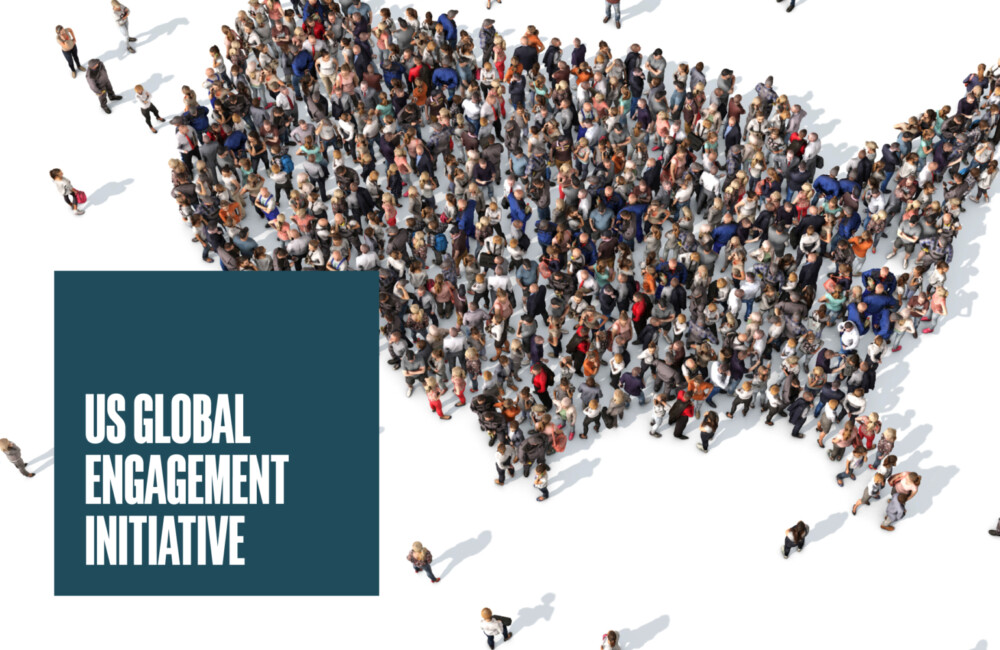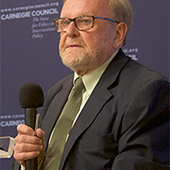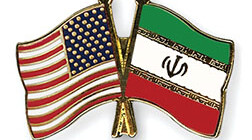Senior Fellow David Speedie interviews Dr. Gareth Porter, scholar, journalist, and skeptic concerning U.S. claims of an Iranian nuclear weapons program.
DAVID SPEEDIE: I'm David Speedie, director for the program on U.S. Global Engagement at the Carnegie Council for Ethics in International Affairs, and this is the latest in our Ethics in Security broadcasts.
Today we are delighted to have as our guest Dr. Gareth Porter. Gareth Porter is an historian, policy analyst, investigative journalist. He is an articulate anti-war spokesman, going back to the days of the Vietnam War when he was the Saigon bureau chief of the Dispatch News Service. He is a graduate of the University of Illinois, University of Chicago, and has a Ph.D. from Cornell University in Southeast Asia studies. He has taught at the City College of New York and American University, and has been published in a number of leading journals such as Foreign Affairs, Foreign Policy, Al Jazeera English, Huffington Post, and The Nation.
Gareth Porter, welcome to the Carnegie Council, and thank you for joining us.
GARETH PORTER: I'm so happy to be on the show, thanks very much.
DAVID SPEEDIE: Excellent.
We're focusing today on your most recent book titled Manufactured Crisis: The Untold Story of the Iran Nuclear Scare. The subject of our conversation will, of course, be Iran.
Before we get to some of the particulars of the book, Dr. Porter, we're at a very interesting point in the P5+1 negotiations in Geneva. Obviously, this has been a little bit, as it were, knocked off the front page by events in Ukraine and Iraq and elsewhere, but we're rapidly approaching, within a week, the July 20 deadline for a deal on the joint policy action that was agreed upon last November. That would allow Iran to enrich, under strict conditions, the reactor in Arak. How do you see the situation at the moment in Geneva, and the prospects for some kind of July 20 breakthrough? [Editor's note: On July 18, the talks were extended for four more months.]
GARETH PORTER: I have to say that I've been tipping a bit back and forth over the past week or so, thinking that if there is indeed sufficient political will on both sides, that they could, in fact, reach a final, sort of last minute agreement. But, I think, realistically, it looks very unlikely at this moment that that's going to happen. Although there is very strong interest in both sides in getting an agreement, there is also a gulf that is quite wide between the two perspectives on this issue of Iran's rights, the international legal right to enrich, as well as the degree to which Iran can and should be trusted, from the American point of view, with an industrial scale enrichment program.
The historical background that I cover in my book is extremely relevant to understanding why—despite the very strong interest on both sides, and, I think it's fair to say, a common interest in reaching an agreement, because failure to reach an agreement has very high costs to both parties—why they are, at this moment at least, not ready, really, to sign on to a common text.
DAVID SPEEDIE: As I understand it, in that regard—not that the points of difference or the points of contention are purely technical—but a lot has been conceded, its seems to me, on both sides, particularly by Iran. What is the main stumbling block at the moment, as I read it, tends to be the origin of the fuel intended for nuclear energy reactors. Iran wants to supply, or to develop its own fuel supply; the P5+1 wants Iran to import the fuel. Is that right?
GARETH PORTER: That is essentially the main stumbling block at this moment, correct. It's a bit more complicated than that because I think that the Iranians are prepared to agree to some kind of compromise in which they would wait some years before they begin to move to an industrial-scale enrichment capability. The United States, at this moment, appears not to be prepared to do that. I think there is a way to compromise between the two sides that would involve this two-stage solution, which the Princeton Group has put forward, a group of scholars at Princeton University.
DAVID SPEEDIE: That's Frank von Hippel and company. [Editor's note: See von Hippel's 2010 Carnegie Council discussion, along with Roald Sagdeev: Beyond the NPT.]
GARETH PORTER: Exactly. Von Hippel and his colleagues have suggested that if you insert into the agreement a provision that would put off the decision about a longer-term enrichment capability for, let's say, six to eight years, that it might be possible then for both sides to view this in a much different context—with more trust on the U.S. side of Iran, and more trust on the Iranian side of that they're not going to be cheated or they're not going to be manipulated by the parties to the P5+1. So, in other words, it would afford more scope for a compromise that is satisfactory to both sides if they were able to do that.
DAVID SPEEDIE: The point being that Iran, basically, on the basis of past history, does not necessarily trust the foreign fuel supply.
GARETH PORTER: That's exactly right. The Iranians have good reason to have a healthy distrust of the Russians, in particular, because as I've written recently in a piece on the subject, in 2005, 2006, 2007, the Russians were very much in the camp of the United States and the P5+1 in putting pressure on Iran to cease enrichment entirely. That was the objective at that point. The Russians had an agreement with the Iranians to supply nuclear fuel for Bushehr, but they, in fact, did manipulate those supplies very deliberately to put pressure on the Iranians, precisely on this issue of trying to get them to stop enrichment entirely. That's why Iran, I think, quite honestly, has a very serious distrust of relying on Russia for their supply of fuel for the Bushehr reactor.
DAVID SPEEDIE: That's a good segue into the book, and again, the title—Manufactured Crisis: The Untold Story of the Iran Nuclear Scare. There are at least three arresting words in that title, Gareth: manufactured, untold, and scare. At one point you referred to this as an alternative narrative. Please give us the highlights of what this alternative narrative means and where it takes us.
GARETH PORTER: It is an alternative narrative and that is necessitated by the fact that over the last decade in particular—but for even a longer period if you really go back to the roots of this problem—the news media have reflected official views coming from the U.S. government, in particular, that Iran has always, from the very beginning, had the intention of manufacturing nuclear weapons and that their civilian nuclear program has been nothing more than a cover for that nuclear weapons intention.
That point of view, that interpretation of Iranian intent in its nuclear program, has been persistently reflected in one story after another—of course, reflecting official statements, but also leaks to the news media, as well as simply the way in which each turn of events, including a very long series of reports from the International Atomic Energy Agency, the IAEA. That is to say, the news media is reporting those reports, in many cases, in a way that accentuates the necessity to distrust Iran's intention with regard to the whole question of nuclear weapons.
So this—what I call a false narrative—has unfolded year after year and, of course, that means that there's layer upon layer of misinformation, which has been absorbed by the public in the United States, and I must say, in the rest of the world, where readers are following newspapers and watching television. This constitutes a very powerful impact on public opinion with regard to the nuclear program of Iran, which is almost entirely false. It's really quite an astonishing phenomenon in my view. It goes well beyond anything else that I can think of—except for a sort of enduring Cold War myth—in terms of shaping public opinion in a way that is almost completely unquestioned in the United States and elsewhere.
DAVID SPEEDIE: Clearly, recent history and even more recent events in Iraq have revived elements of discussion of what got us into Iraq, and clearly, the whole discrediting of the WMD [weapons of mass destruction] Iraqi program, and some false reporting—you bring the media into this, as part of this misrepresentation of what Iran is doing—that happened with Iraq, too; the yellowcake fiasco from Niger, as I recall. Is there some sort of analogy here? Don't we learn from these false alarms?
GARETH PORTER: There is absolutely an analogy and more than an analogy, in fact. What I document in my book is that the very same people who were pulling the wool over the eyes of the American people with regard to creating a false intelligence dossier on Iraq, on weapons of mass destruction in Iraq, were also working on doing the same thing on Iran. It wasn't precisely the same people who were responsible for the two different issues within the Bush administration, but it was the same group of neoconservatives who had the intention, in both cases, of laying the political groundwork for what would be the use of military force in their planning, first of all, against Iraq. That was to be the basis, then, for a much broader strategy of the United States of preparing the ground for, ultimately, regime change in a number of countries in the Middle East, the final crowning glory of which would be regime change in Iran.
In this case, it was under secretary of state John Bolton, who was in charge of the Iran dossier, and I document in my book the way in which he maneuvered, beginning in 2003-2004, to try to move the Iran file out of the IAEA, where the then-director general Mohamed ElBaradei, was viewed, quite appropriately, as a stumbling block to the strategy, and move it to the UN Security Council, where the United States could either get support for punishing Iran in ways which could conceivably involve military force, clearly, or if that failed in the Security Council, then prepare the ground for a unilateral military action against Iran. John Bolton himself has said in his own memoirs that he was convinced that the use of military force would be necessary.
What I document in the book is a strategy, which Bolton certainly worked on in concert with the Israeli government in 2003-2004, to prepare an intelligence dossier that would indict Iran as having a covert nuclear weapons program. So that is the origin of this set of documents, which some have called the "laptop documents," which have been so central to building the case from 2004 to 2011, I would say, that Iran, in fact, was hiding a covert nuclear weapons program.
I have an entire chapter in the book about the real origins of the "laptop documents" and you can trace them through the Mojahedin-e-Khalq [People's Mojahedin of Iran, MEK], which I show having given those documents to the German Intelligence Agency—from the MEK to the Germans, but from Israel to the MEK. There's a whole story about how these documents actually came from Israel and how they were really, clearly not authentic, because you can find traces of contradiction between things that are in the documents and actual facts that can be independently verified.
DAVID SPEEDIE: MEK, is course, the anti-Tehran regime terrorist organization that we recognized, or declassified, from the terrorist list in 2012, as I recall.
GARETH PORTER: That's right. The Mojahedin-e-Khalq was an armed terrorist organization that carried out terrorist bombings within Iran. They were expelled from Iran very early in the Islamic Republic's history, and then moved to Iraq, where they were given shelter and used by Saddam Hussein in the war against Iran. Finally, after that war, they made new arrangements with Israel.
DAVID SPEEDIE: As you say in the book, also though, Gareth, the origins of this, of course, go back well before the period we've just been discussing, the last decade or so. I was struck, particularly in 1989, when there was a period where George H. W. Bush—when Iran intervened in the hostage-holding by Shia forces in Lebanon, the Iranians helped secure a release and it looked like President Bush wanted some breakthrough in relations, but there was some sort of abrupt reversal of that whole process. Give us some illumination of that.
GARETH PORTER: Yes, this is a very important episode in what I call the political origins of the nuclear scare in the United States. From all evidence, what happened to disrupt the intention of President George H. W. Bush to reciprocate the Iranian help in freeing American hostages from Shia militia organizations in Lebanon, was the end of the Cold War. Of course, the effect of the end of the Cold War—and even before it actually was completed with the collapse of the Soviet Union, it was clear to the high-ranking officials in the Pentagon and the CIA that this was about to happen. So they were in a panic about how to really prevent the collapse of their budgets and programs, which would have meant that they would have become shadows of their former selves, as it were.
I document the fact that the CIA's leadership in the late 1980s and through 1991-92 came up with the idea that the new global threat to American security, which would be the equivalent, or the closest thing to the equivalent to the Soviet threat during the Cold War, would be the threat of the proliferation of weapons of mass destruction.
Of course, in that regard, Iran was pointed to as the "poster country," if you will, for that threat. More than any other country, it was Iran that was viewed as the best candidate to replace the Soviet threat with regard to a justification for these programs and budgets, particularly for the CIA but also for the Pentagon. It was Robert M. Gates, who was the newly named director of the CIA in 1991, who articulated that case before the intelligence committees in the first month of his tenure in that position and really made the case that we need to reallocate the funds that we previously allocated to following the Soviet Bloc to the issue of weapons of mass destruction. That means, in particular, watching like a hawk the progress of the Iranian nuclear program.
DAVID SPEEDIE: One can't help, however, thinking about taking Iran on the one hand, and North Korea on the other, if you're looking for a poster child. Here's clearly a crazy regime—well a series of crazy regimes handed down from within the family, as it were; a problem nuclear weapon country with a nuclear weapons program, with a series of bellicose actions, including lobbing missiles over Japan and South Korea; the threat of developing a long-range capacity for delivery of these weapons. Why the focus on Iran? North Korea only seems to sort of come into our ken, as it were, when there is a serious, war-like episode on their part. What's going on here?
GARETH PORTER: This is very complicated, but there are a number of reasons why Iran is the political choice for the U.S. national security state. One, of course, is the fact that the United States already had a history, in Iran, of having the U.S. client state of the Shah overthrown by a regime that was violently opposed to U.S. policy in the Middle East. That, of course, laid the groundwork for a large-scale hostility within the U.S. national security state toward Iran.
Then, of course, there's the Israeli connection as well. By 1993, the Israeli government had made the decision politically to target Iran, or to identify Iran as the existential threat to Israel for domestic political reasons, essentially, which I explain in the book, not because there was real evidence that Iran was going for nuclear weapons, much less that it was targeting Israel at that point, far from it. The Iranians were not, at that point, even close to talking about Israel as an enemy of Iran, a sworn enemy of Iran.
That Israeli connection with U.S. policy certainly plays a key role, which I talk about in the book, of being crucial, particularly in the unfolding of the Clinton administration policy toward Iran. It was no question that that was a key factor.
DAVID SPEEDIE: I want to get on to broader interests that the United States and Iran may have. We understand, okay, there's the U.S. and its allies, and particularly Israel, and the perceived sort-of existential threat, but what about the IAEA? You mentioned that Mohamed ElBaradei was a stumbling block for the United States. But the IAEA has also, am I not correct in saying, pointed to some, at least, withholding of information on the part of the Iranians that has aroused suspicions?
GARETH PORTER: You are correct that that is the public position taken by the IAEA, particularly since the ElBaradi period. He left in late 2009. It did begin, in the final year-and-a-half or so of the ElBaradei period of the IAEA, but it was particularly prominent in the post-ElBaradei period of the IAEA that the agency alleged that Iran was refusing to cooperate with its investigation of these so called "laptop documents."
I thoroughly examined this whole issue, and I'm able to reveal in the book that what actually happened was that in 2008, when ElBaradei's work program was really completed and ElBaradei essentially cleared the files or closed the files on a whole series of issues that had been investigated previously by the IAEA—the issue then became, "What about these documents that had been turned over to the IAEA by the United States?" At that point, Olli Heinonen, who was the head of the Safeguards Department, was working very closely with the Bush administration to promote this whole idea that Iran was hiding something, refusing to explain these documents. I show that there was really very tricky language used in these IAEA reports, beginning in May 2008, suggesting that Iran was hiding something, when in fact, the Iranians were doing their best to provide whatever information they could, in response to the queries from the IAEA.
Later on, you have the IAEA actually putting forward a whole new report, a whole new dossier based on documents, which came directly from Israel. This is simply not widely known. The agency never revealed that the documents came from Israel, despite that ElBaradei reports in his memoirs that they did, in fact, all come from Israel. So there's a lot of deception involved in the IAEA's role, particularly beginning in 2009, and with the 2011 report of the IAEA, which I talk about in the book.
DAVID SPEEDIE: Finally, let's focus on implications of what may or may not happen within the next week and beyond in Geneva. What are the "no deal" implications for both President Obama and President Rouhani in Tehran? Obviously President Obama has sent a pretty high-level delegation to Geneva. He wants this to work. Rouhani, of course, has his own hard-liners to combat. The Supreme Leader, I think, has expressed skepticism about the talks in Geneva. Also, recently—I think last week—the foreign minister of Iran, Mr. Zarif, has expressed the devout wish that we've reached some resolution and moved to other regional priorities that Iran and, indeed, the United States might share.
What do you see as the implications of "no deal," if the worst happens for both the United States and Iran? Where are the opportunities, if we can get beyond this?
GARETH PORTER: If that happens, if there's no deal and that seems most likely at this moment, I think we're in uncharted territory. Nobody really knows how this is going to unfold. What we do know is that Congress will pass new sanctions, and that there will have to be some kind of reaction from Iran. Then you get into a tit-for-tat process, which is inherently dangerous. Beyond that, it's very difficult to predict exactly how it unfolds.
But, I think we have to understand that this is really the outcome of what I talk about in my book as the failure of the United States, in particular, to face the reality, the truth about the Iranian nuclear program. From the very beginning, there was a predisposition on the part of the U.S. national security state to assume that Iran was going to go for nuclear weapons, and therefore to interpret every piece of the most ambiguous evidence, really, as evidence of that intent.
Really, a crucial issue here, which has been completely overlooked in the false narrative of the Iranian nuclear program, is what happened during the Iran-Iraq War. I think this is especially important for your listeners, because it involves the question of the ethical response of Iran to the question of weapons of mass destruction. Because during that war, Iran was subject to eight years of chemical weapons attacks by Iraq. The fact is that Iran never responded, never retaliated with chemical weapons. It never even produced chemical weapons, to the astonishment, I think, of the rest of the world, and to the point where the rest of the world has never quite been able to believe this.
But, this is one of the reasons that I go into in the book—to believe that there was a fatwa by Ayatollah Khomeini, which forbade the use of chemical weapons. That's the only explanation for that failure to retaliate against the chemical weapons attacks. That, I believe, provides the best evidence, irrefutable evidence that Shia jurisprudence that is practiced by the Shia regime in Iran, primarily, of course, through the Supreme Leader of Iran, is a an absolute block to the production chemical and biological and nuclear weapons by Iran. This is a fundamental fact that has been ignored—I think, quite deliberately—by the United States and other Western governments in their assumptions that Iran must be interested in weapons of mass destruction.
DAVID SPEEDIE: Finally, just a quick word on if—let's be optimistic for just a second—something productive does come from Geneva, the prospects for U.S.-Iran cooperation. I would imagine anything from the situation on the eastern border of Iran with Afghanistan, instability in that country, the narcotics trade, regional crises at large—there are possibilities here, if we can get beyond this, yes?
GARETH PORTER: You're absolutely right. That is precisely why it would be so wise for the United States to adopt the positions that we should have a hiatus of some years—perhaps as much as eight years—in which to allow the passions of the past to cool; that is to say, the conflict of the United States and Iran, to cool, and for both sides for realize more clearly, that they can work together and that it makes no sense whatsoever to allow this false narrative of the past to prevent an agreement on a compromise and to begin to allow the continuation of what has already been, in effect, strategic agreement between the United States on a whole series of issues, not the least of which, of course, is the threat from Sunni jihadism in the Middle East.
DAVID SPEEDIE: Our guest has been Gareth Porter, author of The Manufactured Crisis, the Untold Story of the Iran Nuclear Scare. Dr. Porter, thank you so much for being with us and for so much food for thought.
GARETH PORTER: Thank you so much for your interest in the book.



